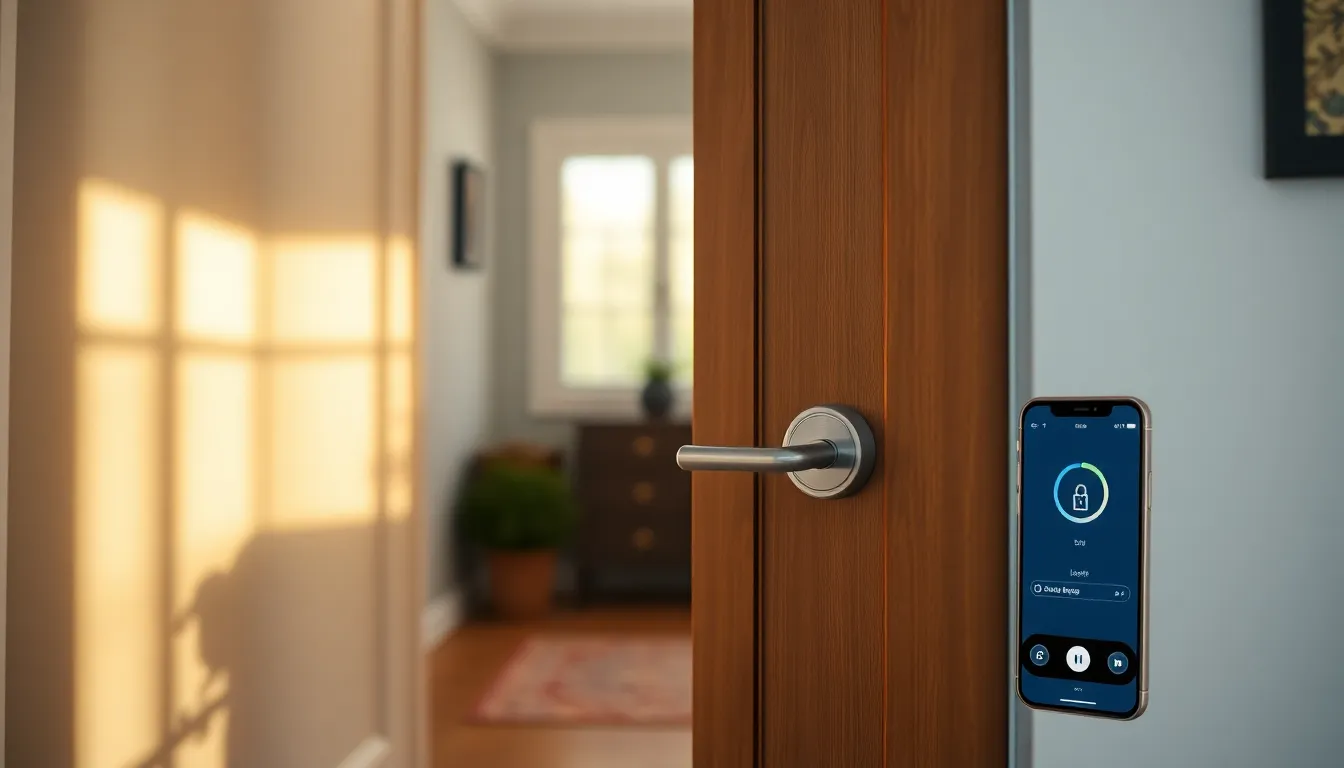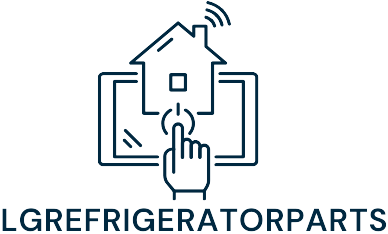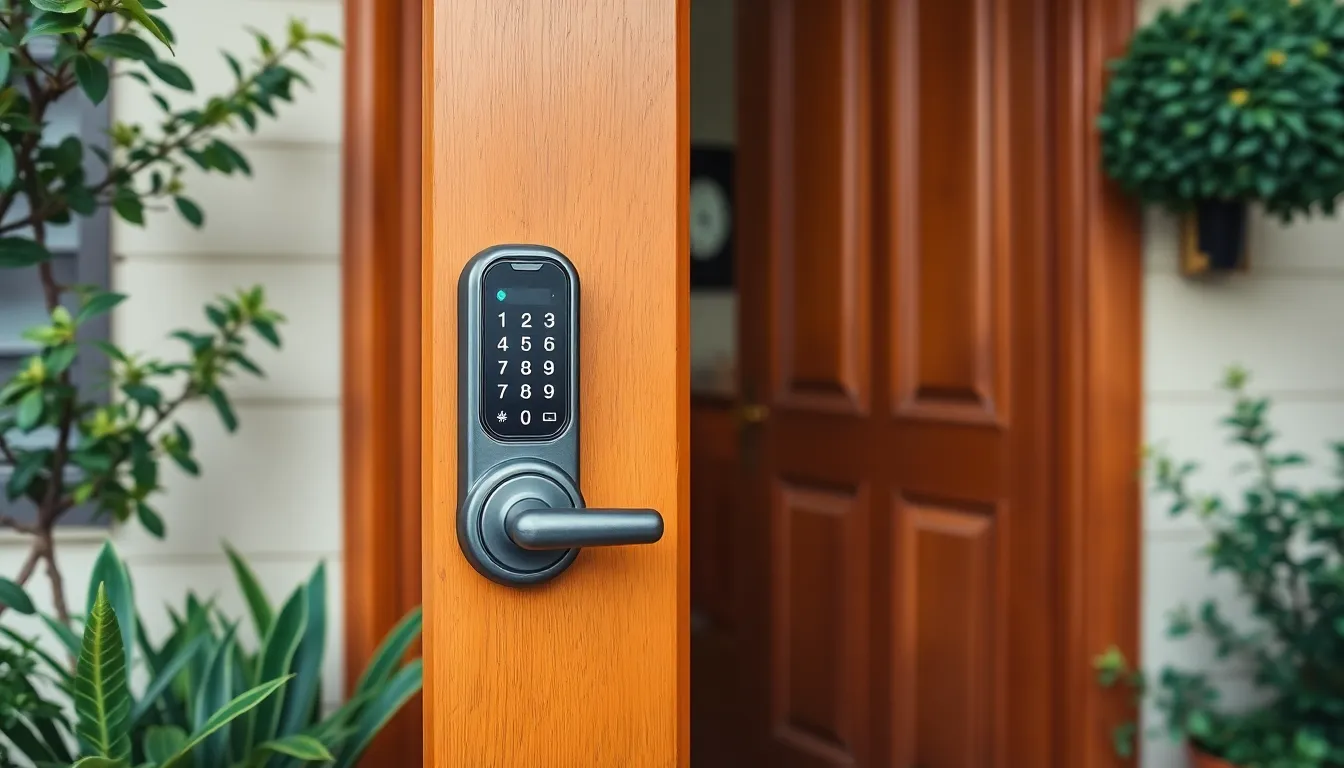Table of Contents
ToggleImagine a world where losing your keys is as outdated as dial-up internet. Enter the smart lock—a modern marvel that turns the mundane act of locking your door into a high-tech experience. With just a tap on your smartphone, you can secure your home, grant access to guests, and even check if you left the door unlocked while sipping coffee at your favorite café.
Overview of Smart Locks
Smart locks combine technology and convenience, providing secure access to homes without traditional keys. Users can lock or unlock doors from their smartphones, enhancing the overall user experience. Remote monitoring allows homeowners to check door status and receive alerts when doors open or close.
Several smart lock features contribute to their appeal. Keyless entry options eliminate the need for physical keys, making it easier to grant access to guests or service providers. Many smart locks allow you to set temporary access codes, perfect for visitors who need short-term entry. This flexibility provides enhanced control over who can enter a home.
Integration with smart home systems adds another layer of convenience. Smart locks often work seamlessly with devices like smart doorbells and home security cameras, creating a comprehensive home security solution. Voice control capabilities also enable locking or unlocking doors through smart assistants, streamlining the process even further.
Battery life is an important consideration for smart locks. Most models utilize long-lasting batteries that can last several months, depending on usage frequency. Some smart locks offer low-battery alerts via connected apps to ensure homeowners remain informed before battery depletion becomes an issue.
Smart locks also focus on security features. Many come with advanced encryption protocols that secure wireless communications, protecting against hacking attempts. Additionally, users can monitor access logs, providing peace of mind by tracking who enters and exits the property.
Overall, smart locks represent a significant advancement in home security technology. They provide enhanced convenience, improved access control, and robust security features, catering to the needs of modern homeowners.
Types of Smart Locks

Smart locks come in various types, each offering unique functionalities to enhance security and convenience. Below are detailed descriptions of the most common types.
Keyless Entry Smart Locks
Keyless entry smart locks utilize keycodes or mobile applications for access. Homeowners set personalized codes for family or guests, making it simple to grant temporary access. These locks often come with added features like alarm settings that alert users to unauthorized access attempts. No more fumbling for keys; entering a code allows seamless entry without physical keys.
Bluetooth-Enabled Smart Locks
Bluetooth-enabled smart locks provide a convenient way to unlock doors using smartphones. Proximity technology allows users to unlock doors automatically when within range, enhancing ease of access. Users control these locks through a dedicated app, which often includes features such as guest access management and monitoring lock status. Bluetooth technology ensures a secure connection, making it reliable for everyday use.
Wi-Fi Smart Locks
Wi-Fi smart locks connect directly to home Wi-Fi networks. These locks enable remote access from anywhere, allowing users to check lock status and control access through apps. Smart notifications alert homeowners about lock activities, enhancing security. Integration with smart home systems facilitates automation, letting users synchronize their locks with other devices like cameras and alarms. Wi-Fi smart locks are ideal for those who prioritize comprehensive control over their home security.
Benefits of Using Smart Locks
Smart locks provide numerous advantages that enhance security and convenience for homeowners.
Enhanced Security Features
Security remains a top priority with smart locks. Many models incorporate advanced encryption protocols that safeguard against hacking attempts. Access logs provide insights into entry activities, allowing users to monitor who enters and exits. Some smart locks even offer alerts for unauthorized access or tampering, whether at home or away. Additionally, features like two-factor authentication strengthen security further. The integration of smart locks with existing surveillance systems can create a cohesive security network, ensuring that homeowners have complete visibility over their property’s safety. Enhanced security features make smart locks a vital upgrade in the home security landscape.
Convenience and Accessibility
Convenience is a key selling point of smart locks. The ability to lock or unlock doors from a smartphone allows for easy access management. Family members or guests can receive temporary access codes, simplifying entry for service providers. Voice control integration adds another layer of ease, enabling hands-free locking and unlocking. Many smart locks operate through Bluetooth or Wi-Fi, facilitating remote access from anywhere, providing users peace of mind while traveling. Smart notifications inform homeowners of lock activities in real time. Overall, smart locks significantly improve accessibility and user experience in managing home entry.
Factors to Consider When Choosing a Smart Lock
Selecting the right smart lock involves evaluating various important factors.
Compatibility with Home Systems
Compatibility with existing home automation systems is crucial. Many smart locks work seamlessly with smart hubs or platforms like Amazon Alexa, Google Assistant, or Apple HomeKit. Choosing a lock that integrates smoothly with these systems enhances the overall functionality of a smart home. Some devices require a specific hub for full operation. Researching compatibility ensures users can control their lock through the same interface as other connected devices. This integration allows for features like setting schedules or linking to security cameras.
Battery Life and Power Options
Battery life often dictates the efficiency of smart locks. Many models utilize long-lasting batteries that can range from six months to two years, depending on usage and features. Low-battery alerts help users stay informed, reducing the risk of lock malfunctions. Power options expand beyond traditional batteries, with some locks offering rechargeable capabilities or connection to a power source. Given that frequent access and smart notifications can deplete battery life, choosing a lock with robust power management is essential. Reliable power sources ensure security remains uninterrupted and hassle-free.
Popular Smart Lock Brands
Several brands dominate the smart lock market, offering diverse features and reliable security.
August stands out due to its retrofit design, which allows users to install it on existing deadbolts. This brand integrates seamlessly with smart home systems and offers mobile app control, making it a flexible choice for many households.
Kwikset provides innovative options, including the SmartCode series. These locks feature a keypad for keyless entry and customizable access codes. With long battery life and compatibility with various smart home platforms, Kwikset appeals to consumers seeking versatile solutions.
Schlage offers a range of smart locks known for their robust build quality and similar features. The Schlage Encode, for instance, allows direct Wi-Fi connectivity, eliminating the need for additional hubs. This model provides a user-friendly experience, making it a top choice for security-conscious homeowners.
Yale, a pioneer in smart lock technology, offers the Assure series, which supports several smart home integrations. These locks feature a touchscreen keypad and allow users to grant temporary access codes. Their focus on security and ease of use attracts a loyal customer base.
Level Lock redefines smart locking with its unique approach to design. It retains the traditional look of a standard door lock while incorporating smart technology, allowing seamless integration with existing keys. This blend of aesthetics and functionality appeals to users who value both style and security.
Each brand mentioned excels in different areas, ensuring options for varied preferences and security needs. Homeowners can consider factors like design, compatibility, and control methods when choosing the right smart lock brand.
Smart locks are revolutionizing home security by offering a blend of convenience and advanced technology. With features like keyless entry and remote access management they cater to the needs of modern homeowners. The ability to integrate with smart home systems enhances their functionality making them a valuable addition to any security setup.
As users weigh their options it’s essential to consider compatibility battery life and specific features that align with their lifestyle. The variety of brands and models available ensures that there’s a smart lock suited for every preference. Embracing this technology not only simplifies access but also provides peace of mind knowing that security is in the palm of one’s hand.



